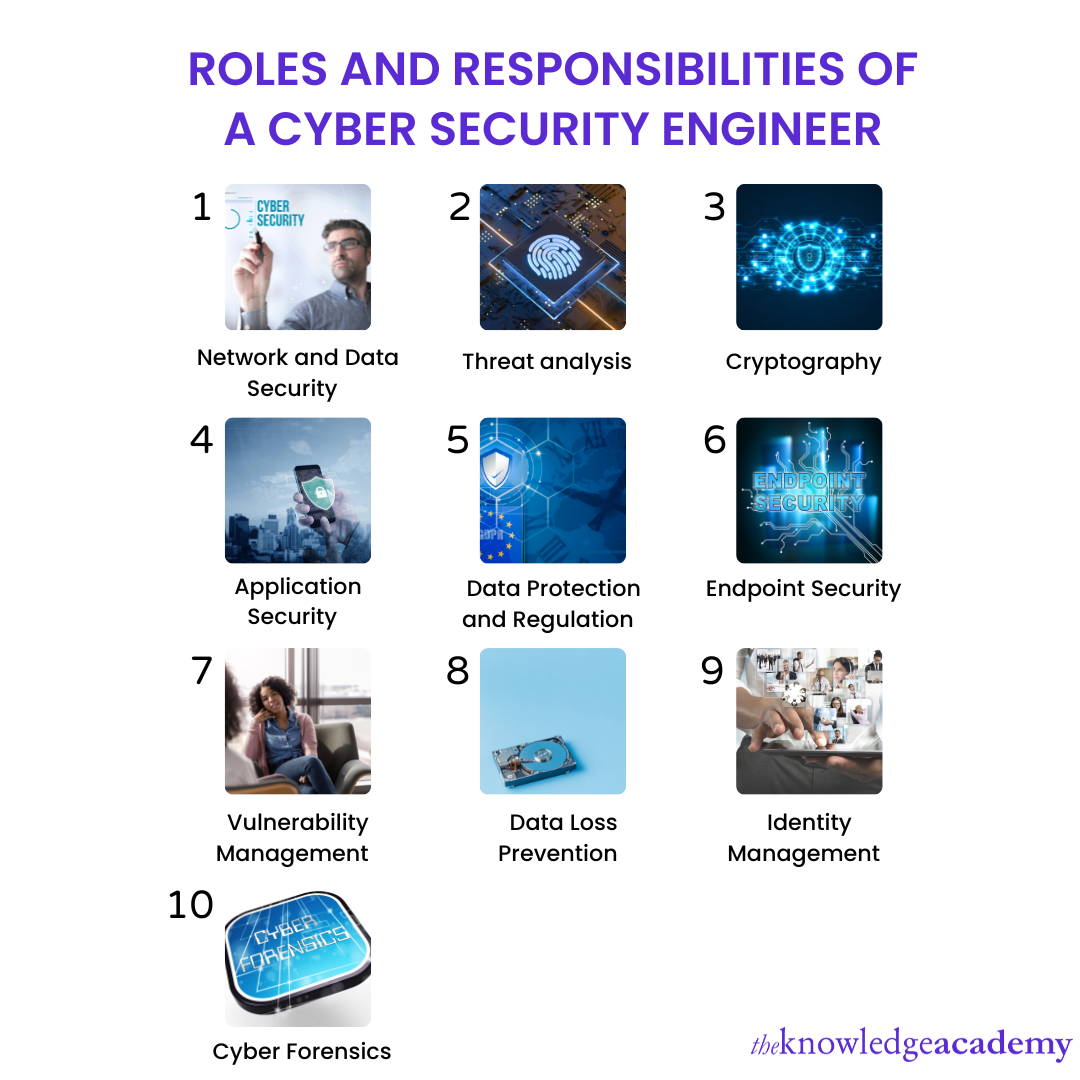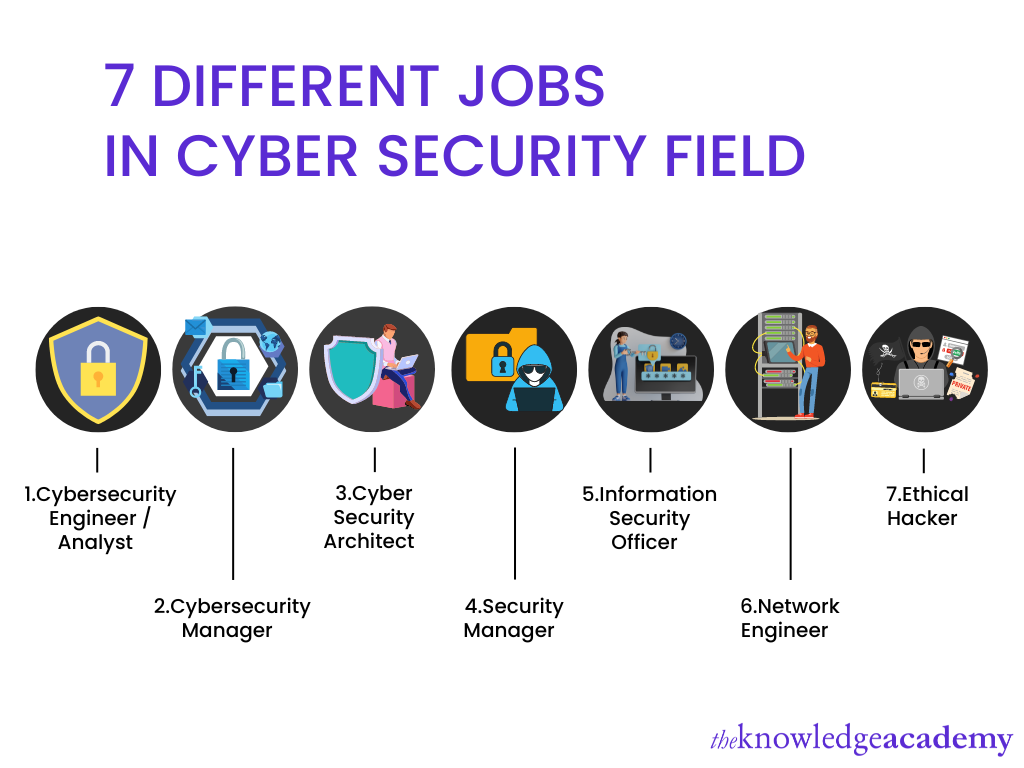We may not have the course you’re looking for. If you enquire or give us a call on 01344203999 and speak to our training experts, we may still be able to help with your training requirements.
Training Outcomes Within Your Budget!
We ensure quality, budget-alignment, and timely delivery by our expert instructors.

As technology develops, so does the need for Cyber Security measures to protect our systems and data from malicious threats. Cyber Security Engineers play a crucial role in preventing Cyber-attacks. The Average Salary of a Cyber Security Engineer is around 82,000 GBP per year. On a year-on-year basis, it is growing about 16 per cent yearly.
According to Statista, the number of devices connected to the internet will grow 300 per cent from 9 billion to nearly 29 billion. That number is going to keep on growing in the coming years. However, this brings on new challenges as there’s a massive shortage of employees in the field of Cyber Security.
Besides, there are new types of threats coming in new forms each day. Cyber Security professionals constantly need to upgrade their skill set to tackle these new challenges. Around 60 per cent of Cyber Security workers are learning new skills and certifications to keep up with the ever-growing challenges.
In this article, we'll look at how to create a Cyber Security Roadmap to advance a career in the field of Cyber Security. We'll also look at the importance of Cyber Security in the digital age and the types of jobs and roles available in this field. Read on to find out if a cybersecurity career is worth pursuing in 2023!
Table of Contents
1) What is Cyber Security?
2) Importance of Cyber Security and the Pillars of Cyber Security
3) Creating a Roadmap to Cyber Security Learning
4) Is a Cyber Security career worth it in 2023?
5) Roles and Responsibilities of a Cyber Security Analyst/ Engineer
6) Career opportunity in Cyber Security
7) How to start a career in Cyber Security?
8) How to create a Cyber Security Roadmap for Beginners?
9) Conclusion
What is Cyber Security?
Cyber Security is also known as Information Technology Security. It protects computer systems and networks from unauthorised access or theft. It includes the prevention of viruses, malware, and other malicious software infecting computers and devices and protecting sensitive data from being accessed or stolen. Cyber Security is essential for businesses of all sizes and individuals who use computers and the internet.
Cyber Security is an important part of the security apparatus of a firm. Every year new attacks happen across the world. Governments and corporations are still trying to catch up as there’s a huge talent shortage in these critical roles.
Basically, Cyber Security protects your computer and network from external attacks like viruses and spam wares. Not only your computer but digital devices like mobile phones, tablets and any other digital device connected to the internet or a public network can be attacked or hacked.
Suppose a device is connected to a public network. In that case, it is more likely to get attacked, and the data is at risk of being stolen, as public networks are more vulnerable to cyberattacks because they don't have proper protection.
Gain an in-depth understanding of threats affecting the technological world. Register for our Certified Cyber Security Professional course now!
Importance of Cyber Security and the Pillars of Cyber Security
Cyber Security has become the new battleground for many nations in their effort to dominate the globe. On a global level, a single Cyber Security breach could cost as much as 3.5 million GBP as of 2022, While in the US, it could cost up to 7.8 million GBP, more than double the global average.
As the number of breaches is increasing every day, the need to implement countermeasures is also growing. Many organisations are constantly looking for new ways to secure their communication channel and data.
Thus, many companies are actively hiring Cyber Security Analysts and Engineers to improve their security apparatus in cyberspace. There’s a significant shortage of these talents, so the future looks very promising for a career in Cyber Security.
The three main pillars of Cyber Security
1) Confidentiality: Confidentiality is all about protecting the data with proper encryption. And ensuring data is only accessed by authorised persons and not others.
2) Integrity: Integrity ensures that the data is not tampered with or manipulated at all stages by unauthorised people.
3) Availability: Availability ensures data is accessible to the authorised person at the time of need.
Creating a Roadmap to Cyber Security learning
Now that you know the importance of Cyber Security, you might become interested in pursuing a career in Cyber Security. The first step is to learn and master the skills necessary to work in this field.
Learning a new skill can take significant time and make you feel exhausted. To prevent this, you can create a Roadmap to learn about Cyber Security correctly. This crucial step can prevent burnout and will accelerate your learning process.
Below are a few tips that might help in creating a Roadmap for Cyber Security learning:
1) Choose a technical field
Suppose you have studied a technical subject like Computer Science right from school. In that case, you are well on your way to becoming a Cyber Security Engineer, as you have the necessary foundational skills to work in a technical field. If you have a graduation/post-graduation in a related technical field, then the odds are in your favour.
2) Get a certification
Certification in Cyber Security can give a significant boost to your resume. Also, if you don't have an education background in computer Science but are still looking to pursue a career in Cyber Security. the certification can prove that you have the right skills to work in this field.
3) Master the fundamentals
Learning the fundamentals can make all the difference and can tip the needle in your favour at the time of hiring.
Sign up for our Cyber Security Risk Management course and become an expert today!
Is a Cyber Security career worth it in 2023?
To answer this, let's take a look at the data from the last two years.
As of 2021, about 11 billion devices were connected to the internet globally.
While in 2022, there were at least 2 billion new devices connected to the internet, and the number of devices connected to the internet stands at a staggering 13 to 14 billion.
As more devices are connected to the web the need to protect these devices from Cyberattacks increases. And who better than a Cyber Security professional to stop these Cyberattacks?
Let's Compare this data with the number of added jobs and talent shortages in the field of Cyber Security.
As of 2022, the number of professionals working in Cyber Security around the world has reached an all-time high of about 4.7 million. Despite that, there’s still a shortage of 3.4 million workers.
So clearly, the demand for Cyber Security professionals is constantly increasing. The proof is in the pudding. There is no doubt that a career in Cyber Security is one of the most rewarding and in-demand professions in the world today. The global economy is increasingly reliant on digital infrastructure, making the need for skilled cybersecurity professionals greater than ever. So yes, a Cyber Security career is worth it in 2023.
Roles and Responsibilities of a Cyber Security Analyst/ Engineer

The roles and responsibilities of Cybersecurity officers are constantly changing and require multitasking. Below are some of the roles and responsibilities of a Cybersecurity Engineer.
1) Network and Data Security
2) Threat analysis
3) Cryptography
4) Application Security
5) Data Protection and Regulation
6) Endpoint Security
7) Vulnerability Management
8) Data Loss Prevention
9) Identity Management
10) Cyber Forensics
Career opportunity in Cyber Security

There are multiple opportunities available in the field of Cyber Security. The number of Cyberattacks keeps rising every day, and so is the need for technicians to solve this problem. The best thing about being a Cybersecurity Engineer is that they can work in any sector and company. Their job is not constrained to a single vertical, and has the freedom to choose the company of their choice.
7 Different Jobs in Cyber Security Field
1) Cybersecurity Engineer / Analyst
2) Cybersecurity Manager
3) Cyber Security Architect
4) Security Manager
5) Information Security Officer
6) Network Engineer
7) Ethical Hacker
Learn how to prevent cyber threats. Check out our Cyber Security Awareness course today!
Cybersecurity Engineer / Analyst
Cyber Security Engineer/ Analyst is an entry-level position in the field of Cyber Security. The job of a Cyber Security Engineer is to identify and assess the threats. These threats can come up in any form, like Computer viruses, malware, spyware, ransomware etc. Apart from this, they need to develop and implement a strategy to mitigate these threats.
Cyber Security Manager
This is a management-level position. The job of a Cyber Security Manager oversees other analysts and engineers and makes sure the process runs smoothly. This position generally requires more experience and could command higher pay.
Security Architect
This is a mid-level position in the field of Cyber Security. A Cyber Security Architect is responsible for risk assessment and checking for vulnerabilities. They also do other crucial tasks like penetration tests and implementing security protocols.
Security Manager
This is also a management-level position and requires more experience. Their job is to oversee employees and security measures implemented to prevent breaches.
Information Security Officer
This is a mid-entry level position and requires experience. To become an Information Security Officer, one must have prior experience in similar roles like Network Administrator or Systems Administrator. Having a certification can also help in advancing their career.
Network Engineer
Network Engineering is a favoured position in many organisations, and this job generally requires a professional-level certification. Their job is to design and establish a networking environment. In addition, they also need to monitor the Local Network and ensure there are no disruptions.
Ethical Hacker
Ethical Hackers or White Hat Hackers are professionals employed by a firm to find out vulnerabilities in their security apparatus. These are professionals with advanced hacking skills who perform tasks like penetration tests to find out whether the data and network are secure.
How to start a career in Cyber Security?
The first step you should take when thinking about a career is to create a Roadmap. This step is often overlooked; however, it is essential and can make all the difference. Remember, effort without a solid plan is a sure path to failure. So, plan to succeed by creating a solid plan.
How to create a Cyber Security Roadmap for beginners?
Here are a few key points to create a Roadmap for beginners in Cyber Security:
1) The important thing first is to choose a niche and get better at it.
2) Improve your foundational and technical skills.
3) Hone your skills by learning new things and acquiring certifications.
4) Learn & practise the roles and responsibilities of a Cyber Security Engineer.
5) Upgrade your skills, as Cyber Security is a constantly evolving field.
Conclusion
We hope, through this blog, you got a detailed understanding of Cyber Security and how it is becoming increasingly prevalent, with a larger number of businesses affected by Cyber-Attacks each year.
Check out our Cyber Security Training Courses which will teach you how to avoid and protect against Cyber Security threats.
Frequently Asked Questions
Upcoming IT Security & Data Protection Resources Batches & Dates
Date
 Certified Cyber Security Professional (CCS-PRO)
Certified Cyber Security Professional (CCS-PRO)
Fri 9th Aug 2024
Fri 6th Dec 2024
Fri 21st Mar 2025
Fri 23rd May 2025
Fri 22nd Aug 2025
Fri 5th Dec 2025







 Top Rated Course
Top Rated Course




 If you wish to make any changes to your course, please
If you wish to make any changes to your course, please


